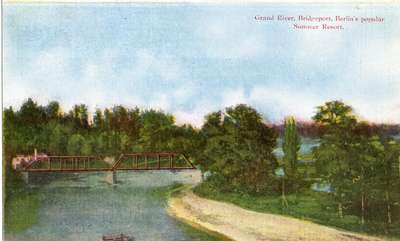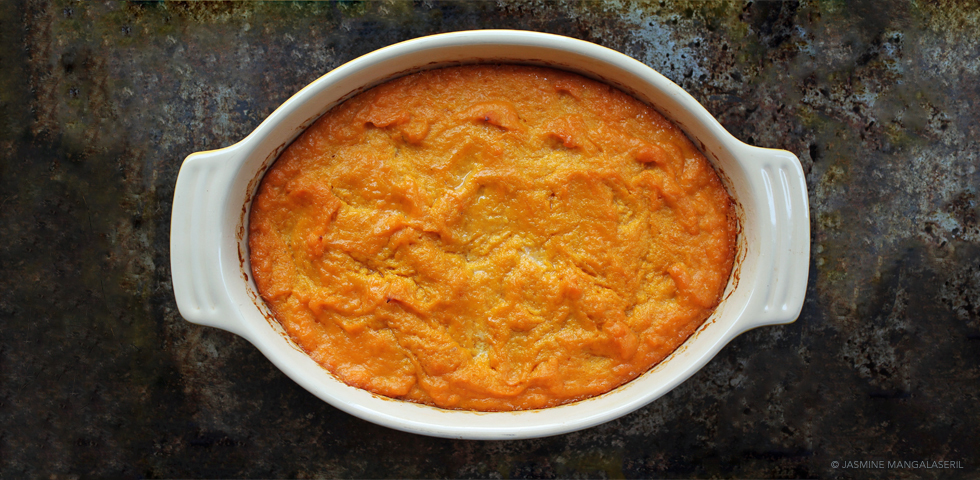
SOS
A severe storm passed over the northern part of the County just before suppertime on 15 June. The next day, The Berlin Daily Telegraph’s front-page story, “Cyclone sweeps over Elmira,” described the swath cut through the small town. No one was injured, but shortly after the winds picked up, “it developed into a cyclone which would have done credit to the islands of the South Seas.” 15-30 metre roof sections (30-50 feet) ripped from buildings; trees lifted from orchards, and basements filled with water. Torrential rains washed out the railway tracks, and trees “whirled about on Church Street like thistledown in the wind.”
Building me a fence, building me a home
Three months after Victoria Park’s pavilion caught fire, the park board decided to base the new building’s design on one of two of Detroit, Michigan’s pavilions at Belle Isle Park (see notes). “The new pavilion will be a beautiful frame structure 75 feet by 75 feet [approximately 23 m2] with a concrete foundation and posts.” Since lumber from the old building could be recycled, it was thought the new structure could go up for approximately $600 (less than $12,000 – see note on conversion).
Facing 20,000 of your friends
A band of itinerants who encamped along the Grand River caused a stir in Bridgeport. After staying for about a week, they decided to “run the whole village.” Drunk, with axes in hand, they stood at the end of Bridgeport Bridge and stopped all pedestrians from crossing. They then turned on themselves “and afforded the villagers a regular burlesque, free of charge.” The constabulary blamed “that liquid which is sometimes termed ‘firewater,” and didn’t believe the drunkards’ promises to behave themselves. The travellers had until morning to “pack up and ‘git’.”
The next day, there was little evidence of the unruly interlopers.
Knowing my fate is to be with you
Maybe it was because committee delegates met almost exactly 101 years to the day of Napoleon’s famous defeat, but Waterloo’s contingent seemed to think they were the reincarnation of Wellington and the Seventh Coalition. At their meeting, the Berliners and Waterloo-ites seemed to discuss one issue at length. Simply put, either the united city’s name would be Waterloo or amalgamation wouldn’t happen.
I feel like I win when I lose
Back at Berlin’s council chamber, delegates reported back to the city fathers. Aldermen Reid’s and Schnarr’s resolution reflected the amalgamation meeting’s tone and timbre: “that a vote of the electors of Berlin be taken at the earliest possible date on the following question, ‘Are you in favour of amalgamation of Berlin and Waterloo, and that the name of the joint [municipality] be Waterloo?’”
A heated discussion ensued.
Reid said it was “impossible to arrive at any other terms” and “the quickest way out of the difficulty.” It was also a fair way for Berliners to indicate their interest in taking Waterloo’s name.
Mayor Hett suggested offering voters their choice of two ballots: one with six names to be considered (for those who didn’t want to join the two communities), and the other with Waterloo (for those who wanted unification). If a non-Waterloo name had the most votes, that would be the new name for Berlin. If Waterloo had the most votes, the Railway Board could quickly ratify the decision to unite.
Alderman Hahn didn’t oppose the merger, but wanted the neighbouring town to submit a bylaw to its citizens and then come to Berlin. “We will amalgamate on a fair basis only. We will consider it on common grounds.”
Alderman Cleghorn thought Berlin would be made a fool of for setting the question to electors before Waterloo’s voters said if they wanted to unite or stay separate.
Alderman Rudell, who was one of Berlin’s delegates, thought Waterloo’s committee wasn’t serious, “They have a name to sell. If they can’t sell it, they’ll have nothing to do with us.”
Alderman Gallagher deemed the proposal an annexation, not amalgamation, “If they would force the name on us, what would they not force on us later?”
After clarifying what the Waterloo delegates said, Alderman Gross uttered, “Oh, if that’s the case, I would have nothing to do with it. There is no chance of dealing with it.”
My my
Mayor Hett requested Reid and Schnarr rescind their resolution, but “the movers were determined.” It was defeated. Although the mayor didn’t record the votes, The Telegraph reported only the mover and seconder supported it.
Mamma mia, here we go again
City Council met, as a committee, before “a goodly number of ratepayers,” to select the shortlist of possible city names. A special committee had already plucked 235 names “out of the grist,” from the more than 30,000 received suggestions.
Mayor Hett called the meeting to order, and Gallagher took the chair. The committee removed the naming constraints from the previous attempt to find a name. The only guideline listed in news coverage was the shortlist’s names had to be unique in Ontario.
So I made up my mind, it must come to an end
The process in reducing the names was similar to The Committee of 99’s:
- Members struck off undesirable names, reducing the selection to 38 possibilities.
- The names were checked against those already in use in the province. As a result, Dominion City, King George, Huron, Empire, Brocton, and Brocklin were removed from contention.
- The remaining names were called for support: if three committee members liked the name, it made it to the next round. The list now stood at 20.
- A series of votes took place to determine which six names would go to electors; the most popular name from each round would appear on the ballot:
- Round One: (no clear majority)
- Round Two: Brock, Kitchener (it seemed they tied or both had high numbers)
- Round Three: Corona
- Round Four: Adanac
- Round Five: Keowana
- Round Six: Benton
This time, we’re through
The Committee then assumed their roles as aldermen and passed a motion to present the above six names to electors (Gross abstained). They also agreed to order the names on the ballot in the order chosen, and voting instructions would be printed in English and German, “as usual.”
Notes
- As best as I can find, the Detroit pavilions could be either this one or this one. Here’s the website for the current pavilion.
- No, there weren’t 20,000 travellers, but the lyric (almost) fit.
Want a bit more information?
- About the Kitchener 1916 Project
- Click here to read a summary of shortlisting Berlin’s possible names
- Bank of Canada’s Inflation Calculator was used to calculate modern price equivalents (2016)
- For readers unfamiliar with Waterloo Region’s communities, here’s a link to the Region’s interactive map
The Recipe
While many local cookery books and newspaper recipes I’ve found have focussed on British food, I have found a few collections of “foreign” recipes. This recipe for puréed sweet potatoes is from a pre-war book that offers a different recipe every day from around the world. There are some dishes I’d like to explore, so I’ll probably revisit it before the year’s end.
Whether or not this is truly a Belgian recipe (or a derivative dish from the Congo) is neither here nor there. It’s an easy recipe—and one, I think, that can be adapted to taste—spicier, hotter, smokier—or a dessert.
Belgian Sweet Potato Puree, from 365 Foreign Dishes: A Foreign Dish for every day in the year. No author listed (1908)
Boil 4 sweet potatoes until soft. Mash until smooth with 1 tablespoonful of butter, 2 beaten eggs, 1 tablespoonful of brown sugar, 1/4 teaspoonful of cinnamon and 1/4 cup of milk. Beat well. Put in a buttered pudding-dish; pour over some melted butter; let bake until brown. Serve hot with broiled steak.
Belgian Sweet Potato Purée (Modern Equivalent)
Serves: 6
| 1 kg | 1kg | 2-¼ lbs | Sweet Potatoes |
| 15ml | 15g | 1 Tablespoon | Butter |
| 2 | 2 | 2 | Eggs, beaten |
| 15ml | 15g | 1 Tablespoon | Brown Sugar |
| 0.82ml | 0.82ml | 1/8 Teaspoon | Cinnamon |
| 60ml | 60ml | Scant ¼ Cup | Milk |
| Melted butter, to taste |
Peel and chunk the potatoes into a uniform size. Boil until fork tender.
While the potatoes are cooking, butter a baking dish. Preheat the oven to 190C/375F.
Mix together the beaten eggs, sugar, cinnamon and milk. Set aside
When the potatoes are done, drain and mash with butter. Add the milk mixture and stir well. Pour into the prepared baking dish and riffle the top a bit. Drizzle melted butter over top.
Bake for 30-45 minutes until the top has browned.
Notes
- To avoid curdling, let the cooked potatoes cool a bit before mixing in the egg mixture. If you don’t have the extra 10 minutes, then temper the eggs mixture with a bit of the hot puree before mixing all together.
- If serving this as a side dish, I’d add
- A good pinch of salt and pepper
- A squeeze of lemon
- Smoked paprika or some ancho chillis
- Personally, I think would be a good pudding or a pie filling.

